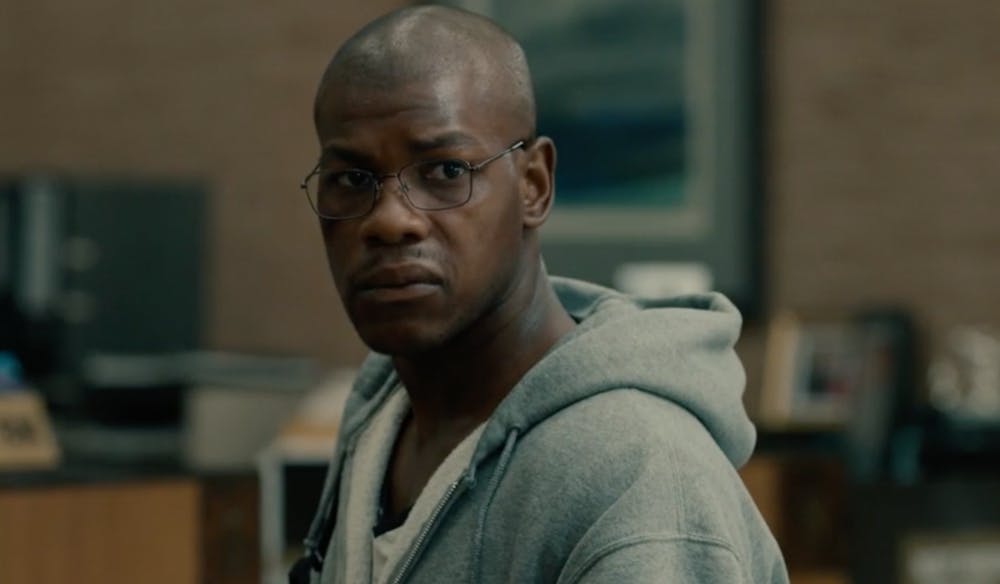After spending the early years of his career known only for playing a severely underdeveloped supporting character in Disney’s fleet of modern “Star Wars” films, Englishman John Boyega has finally received his proper introduction as an actor. It comes in “Breaking,” the debut feature from director Abi Damaris Corbin that tells the heartbreaking true story of Lance Corporal Brian Brown-Easley. In 2017, the 33-year-old African American Marine veteran held up an Atlanta bank to protest Veterans Affairs’ failure to pay him the disability check he needed to survive. Boyega is powerful in his portrayal of Brown-Easley, at once channeling the crazed recklessness of Al Pacino in Sidney Lumet’s “Dog Day Afternoon” and evoking sympathy for a good man driven to criminality by a society that refuses to care for him. But for all the merits of his performance, “Breaking” is not Boyega’s movie, nor Corbin’s, nor any of the other impressive actors or crew. Rather, it belongs to the men and women who served the United States overseas only to be forgotten upon returning home, especially those — like Brown-Easley — whose fight to be heard is further beaten down by racism.
When “Breaking” begins, Boyega’s Brown-Easley is being escorted in handcuffs out of a Veterans Affairs building. Why, we do not know yet. Corbin quickly brings Brown-Easley’s life into focus, introducing his ex-wife, Cassandra (Olivia Washington), and his young daughter, Kiah (London Covington). Brown-Easley speaks to Kiah on the phone while walking the Atlanta streets at night, promising to fulfill her wish for a puppy. But as the time on his cellular plan runs out mid-call, and he disappears alone into a derelict motel room, the reason for Brown-Easley’s removal from the VA building becomes clear. The next day, the defeated ex-Marine will walk into a Wells Fargo branch with a homemade bomb and take two employees (Nicole Beharie and Selenis Leyva) hostage, demanding an audience with the media so he can speak his truth about the VA’s negligence to grant him the financial support he was promised.
“Breaking” is through and through a terrifically acted film. Every character, from Beharie’s frightened yet resolute bank manager to Jeffrey Donovan’s racially prejudiced law enforcement officer, is imbued with substantive personality by their actors, ensuring that this real-life story is populated with people of real feeling. Especially noteworthy is the late Michael K. Williams in the role of ex-Marine and Police Sergeant Eli Bernard, the negotiator who makes the closest contact with Brown-Easley. With Boyega’s character in a state of crisis, the panicked hostages fearing for their lives and the frenzy of police and reporters outside the bank stoking the chaos, Williams’ Sergeant Bernard provides the film’s sole calming presence. His low, gruff voice reassures Brown-Easley as the two men communicate over the phone, Bernard comforting the distressed Marine by recalling his own service in the corps. He then calls Ms. Brown-Easley and assures her that her ex-husband is a good man, one he is determined to bring out of the bank alive. Strikingly offset by Bernard’s fierce outbursts against reporters and police jeopardizing the security of the delicate situation, these tender moments earn intense sympathy for Williams’ character. Should this be the final posthumous role we see him in, it is unquestionably an admirable one.
Only one character in “Breaking” is more sympathetic than Sergeant Bernard, and that is Brian Brown-Easley himself. John Boyega honors the man by playing him on-screen just as he was in life: a gentle, kindhearted soul pushed to extreme ends by the pressures of circumstance. As Boyega initiates the holdup, he softly addresses Leyva’s bank teller as “Ma’am,” feverishly apologizing after raising his voice in a moment of panic. When a supposed gunshot rings out, he throws himself on top of the woman to protect her, scurrying off when she screams and stammering that it was just a “reflex.” Everything that Boyega says and does reveals a man trying to appear as a threat only to be betrayed by the goodness of his own nature. It is a complex, painfully endearing performance, and it is sure to raise the young actor above the doldrums of his “Star Wars” past.
For a film so dominated by acting, it’s ironic that the most lasting contribution of “Breaking” is the product of a shot. In a flashback, we are shown one of Brown-Easley’s many failed attempts to retrieve his missing disability check from Veterans Affairs. As he walks out of the VA office empty handed, the camera leaves him and tracks through the waiting room. It is inundated with veterans, men and women, all blank in the face, motionless. Brown-Easley reenters the frame, and there is a cut back to the action within the bank. In just a single ten-second tracking shot, “Breaking” makes the core statement for which it exists: America is failing its veterans.
While only 7% of the U.S. population are ex-military, nearly 13% of the country’s homeless have served in the armed forces. For Black veterans like Brown-Easley, who believed that he would be shot by police immediately upon stepping outside the bank, the outlook is even more grim: Black veterans make up a third of all homeless veterans. This reality cannot be tolerated — people need to know, and action needs to be taken. “Breaking” did not set any box office records, but if it can raise awareness of the plight of U.S veterans struggling to provide for themselves and their families, that will be a victory bigger than any dollar amount. Then, we can hope for a day when nobody will ever be driven to do what Brian Brown-Easley did in 2017. Then, our veterans will be welcomed home.
Jack Torpey '24 (he/him) is an Arts and Culture Editor. He writes film reviews for the Reel Critic column.
Jack is studying English with a minor in Film and Media Culture. Outside The Campus, he works as a peer writing tutor at the Writing Center and is a member of the Middlebury Consulting Group.




